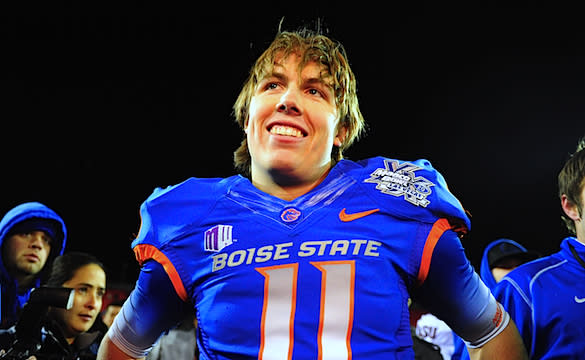Kellen Moore, big man on campus, is back to being the little guy

Like any good system for sorting and classifying large amounts of information, the NFL's scouting process begins with a template — a broad set of probabilities that form baseline assumptions — and revises as necessary in specific cases. One of the basic templates for pro quarterbacks, for example, is "tall": Only five QBs currently listed on an NFL roster are listed at 6-feet or shorter, and only two (Drew Brees and Michael Vick) are starters. Only one (Cleveland backup Seneca Wallace) is listed at 5-foot-11, and he brings the added value of being able to line up at wide receiver.
No one is about to mistake Kellen Moore for a potential receiver. But as the Idaho Statesman writes today, after measuring in a hair under six feet this week at the Senior Bowl, the winningest quarterback in the history of big-time college football has a little convincing to do:
"It's one of those deals where I've been this height probably since I was a freshman in high school. I went through it from high school to college and I'll go through it again," Moore said, "and if someone says I'm too short, smile at 'em and maybe remember the name. … If you can move the ball down the field, they'll let you play."
[…]
Coaches from the Redskins and Minnesota Vikings, who are leading the two Senior Bowl teams, agree with Moore.But they also say height has its advantages — and it takes a player with special skills to overcome a deficiency there.

For almost all of the 6-foot-or-shorter signal-callers drafted since 2000, the "special skill" that (theoretically) allowed them compensate for their height was mobility, which has proven to be the case for Vick and Wallace and will likely be the deciding factor if the pedestrian Moore is passed over in April for Wisconsin's Russell Wilson, who came in at just 5-10 at the Senior Bowl but makes up for it with demonstrable athleticism that Moore demonstrably lacks. Even Drew Brees was considered fairly mobile coming out of Purdue, and clearly had a big-league arm that Moore also seems to lack. The "eyeball test" alone is likely to drop him into the sixth or seventh round, behind a handful of prototypical pocket slingers — Nick Foles, Brock Osweiler, Ryan Lindley, Kirk Cousins — whose college resumés are just a shadow of Moore's.
But then, we've heard that before. The skills that Moore shares with Brees are the hardest to measure, the hardest to explain and probably the most important: He's smart, he's accurate and he has a kind of sixth sense in the pocket that helped him finish as one of the least-sacked quarterbacks in the nation four years in a row. (I can't separate Moore's numbers, individually, but as a team Boise State allowed 33 sacks in 1,829 pass attempts from 2008-11, or roughly one for every 55 dropbacks.) He has the same elusive Jedi quality that's going to put Brees in the Hall of Fame.
At least, he did at Boise State, which didn't exactly put him up against the créme de la créme of college defenses on a weekly basis. Against the relatively heavy-hitting units he did face — TCU in 2009, Virginia Tech in 2010, Georgia and TCU last year — he was quietly, lethally efficient, but in a steady, within-the-offense kind of way that didn't stand out until you looked at the box score. With the rare exception, he doesn't make the kind of transcendent plays that make you think, "I don't care how tall he is, this kid is a player." He sneaks up on you.
When it comes to skeptical draftniks, though, the problem is that there is very little time to chip away at the assumptions, and some of the opportunities that do exist — running an unfamiliar offense in the Senior Bowl, or getting poked, pinched and prodded at the combine — don't necessarily play to Moore's savvy precision, especially when one bad day can send your stock plummeting. Neither does being funneled directly into a backup role as a sixth or seventh-rounder. If Moore is a viable pro, his window for proving it
- - -
Matt Hinton is on Facebook and Twitter: Follow him @DrSaturday.

